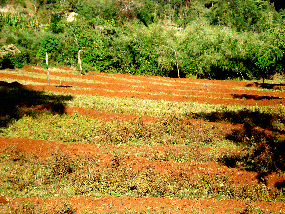Terraces
Terraces are earthen embankments installed at right angles to the steepest slope to intercept the surface runoff. An embankment usually consists of two parts:
- an excavated channel
- a bank or ridge on the downhill side of the channel which is formed with the material excavated from the channel (Lal 1995).
Different types of terraces exist, based on the design and shape of the channel and the ridge. They should be selected in accordance with the local conditions and problems.
Bench Terraces occur in the Gina River catchment (see figure 1). This type of terracing is practised on areas of steep slope. Building only walls that reduce slope length is not sufficient here to reduce the power of the runoff. Additionally, it is necessary to modify the degree of slope by half-excavating a channel and half-filling a bank. The original ground will be converted into level, step-like fields.
The main functions of bench terraces are to
- control erosion by reducing the degree and length of the slope;
- increase the infiltration of rain water;
- maintain soil fertility;
- allow improved irrigation where necessary
(Tidemann 1996).
The constructed terraces (as well as the other physical measures) can be applied together with several biological measures, which are described in the following.
